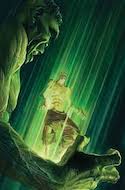Thursday Comics Hangover: Hulk feel existential dread!

Al Ewing is doing some of the best work at either of the big two superhero publishers right now. How good is he? He got me to read and enjoy a Deadpool miniseries. That's no small feat.
And now, Ewing is hard at work on another difficult Marvel character: the Hulk. Lots of writers have made their own imprints on the Hulk over the years — I grew up with Peter David's run, but that Bill Mantlo stretch in the 1980s was just as groundbreaking as David's, if not more — but Ewing is doing something else again: he's recasting the Hulk as a horror comic, and he's succeeding.
The Immortal Hulk, as Ewing's run is titled, began as a kind of gimmick in single-issue stories: Bruce Banner would die in some gruesome way, then the Hulk would briefly show up and enact an ironic form of justice. It was the kind of formula we've seen in comics since at least the early days of The Spectre, and it was enjoyable enough.
But the last few issues of Ewing's run have changed the character of the Hulk in some deeply disturbing ways. It sent the Hulk, literally, to hell, and made him join forces with some unlikely allies in a quest to escape. This Hulk — more literate than past versions, and gaunt like a corpse — is beyond good and evil. He's a monster with his own mysterious agenda, and he'll defeat the devil himself if he gets in the Hulk's way.
Issue 13 of The Immortal Hulk sees the conclusion of one story and the beginning of another. It has deepened the character's story by making him the first in a small army of gamma-ray-powered "metaphor people," and it has promised more revelations to come. And it ends with one of the most affecting last pages I've seen in a superhero comic in recent memory: Bruce Banner, the monster at the heart of the Hulk, writhing in an agony of his own making, seeking some kind of salvation. It probably won't end well for him.